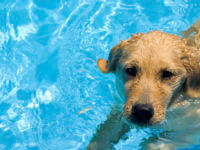My dog Magic loved carpet. With carpet, the possibilities were endless: it provided a convenient way to scratch an itch, a doormat to wipe his feet on after running through a mud puddle, his own giant napkin after dinner time, and the ideal terrain for scooting. Despite our attempts to train Magic and separate him from his carpet infatuation, eventually his black hair seemed to melt into every fiber of it no matter how many times we vacuumed. My family became so fed up with his unsanitary carpet habits that we ripped up all the carpet and replaced it with floors. Magic’s carpet shenanigans were then limited to one small rug kept next to the door especially for him.
Eliminating the carpet successfully prevented Magic from indulging in some undesirable behaviors, but he would still occasionally scoot on his rug. But scooting often indicates a deeper issue than behavior alone. Dogs and cats can scoot for a variety of reasons, especially if their anal glands are full and uncomfortable. Even though Magic usually was able to express his anal glands on his own through normal bowel movements, at times he had difficulty if he had loose stool, diarrhea, or a dietary change. So when we caught him scooting, we scheduled an appointment with a trained veterinary technician to ensure his glands were expressed correctly to avoid further irritation.
One time Magic’s anal glands became blocked and ruptured, causing an infected, painful wound on his rear. Magic’s veterinarian prescribed medication and strict e-collar use (also known as the Elizabethan collar or “cone of shame”) to help the wound heal and prevent him from causing further discomfort by licking the area.
Watching Magic miserably wait for his wound to heal influenced us to try anything necessary to help him avoid future anal gland issues. We began feeding him a high fiber diet to encourage expressions through bowel movements, and he also required more consistent expressions with a veterinary technician. Our heightened awareness of the troublesome consequences of blocked anal glands helped Magic never experience another blockage.
Dogs and cats often scoot in an attempt to lessen discomfort caused by full, irritated anal glands. Many animals are able to express their anal glands through normal bowel movements, but others require a high fiber diet and/or regular anal sac expression. If anal glands are too full or blocked, they become uncomfortable, infected, and can eventually rupture, causing a painful wound. Most effective anal gland expression is done internally by a trained veterinary technician in order to avoid incorrect expression, which could cause damage.



